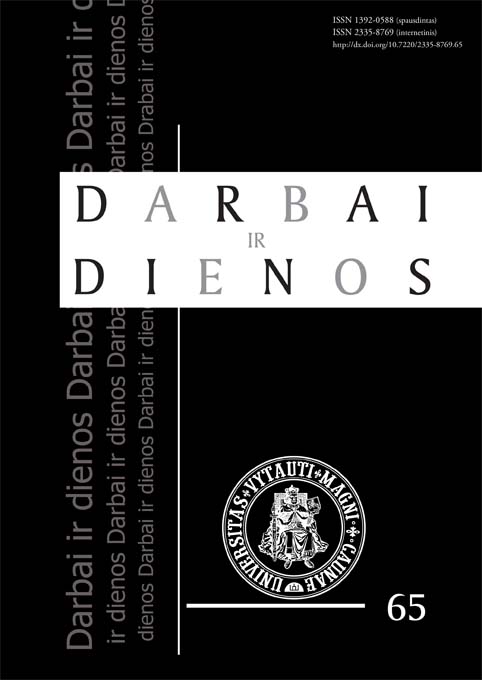Lietuvių kalbos mokytojai standartinės kalbos ideologijos nelaisvėje: nuostatos, praktikos, pasekmės
Lithuanian Language Teachers in the Captivity of Standard Language Ideology: Attitudes, Practices, Consequences
Author(s): Miglė Keturkienė, Loreta VaicekauskienėSubject(s): Language and Literature Studies
Published by: Vytauto Didžiojo Universitetas
Keywords: Teachers’ perceptions of language; Language corrections; Standard language ideology; Language variation
Summary/Abstract: The focus of the paper is on the impact of standard language ideology on the attitudes of teachers of Lithuanian language and literature. A pilot study, consisting of 10 qualitative interviews, was conducted in secondary and high schools in the two largest cities of Lithuania, Vilnius and Kaunas. The aim was to examine how teachers (all female professionals) will grade Lithuanian speech varieties (standard language (SL), dialects, and youth language) and assess their functionality in and outside the classroom, as well as how much they will rely on the practice of correcting the students’ speech. The investigation was supposed to highlight typical cognitive schemes in teachers’ conceptualization of the Lithuanian language. The research is based on the assumption that due to institutional power and authority, ideological routines exercised at school are disseminated into the community and can influence the ways people perceive and treat each other’s language. The Lithuanian findings are evaluated in the light of recent developments in the field of language education. Growing recognition that rigid standard language ideology (SLI) can cause a number of social, psychological, and pedagogical consequences when practiced in educational settings has introduced a language awareness perspective to language teaching theories and practices. Discussions are being included into the curricula of school educators on how to diminish negative stereotyping of non-standard speech varieties and to acknowledge the importance of linguistic variation for the social identity of speakers (cf. Kristiansen 1990: 291, Cross, DeVaney & Jones 2001, Razfar 2005). It has been argued that modern schools no longer have to reproduce power relations (Heller & Martin-Jones 2001: 11) and that school teachers may take the liberty of changing the habitual game rules (Roberts & Sarangi 2001). The research on Lithuanian teachers’ attitudes revealed a clear bias towards the conservative perception of language variability and non-standard language varieties. Regardless of the difference in age, all informants reproduced the main value scheme, proposed by the SLI, in which the hierarchical relation of language varieties is unquestioned and where the SL is placed at the top of the hierarchy. In some of the interviews, a limited positive assessment of dialectal and youth speech was noticed – some teachers recognized the sociocultural value of non-standard varieties for their speakers and language diversity in general. Yet the stereotypical view was dominating. The value of dialects was seen not in their functional applicability, but rather in an ethnographic symbolism, whereas youth speech was assessed as a restricted and incorrect private code. During the class practices, all teachers claimed to perform the role of the controllers of the students’ language. When reporting on their own language choices in different formal and informal contexts, most informants asserted that the SL should be encouraged in all cases. Potential broader use of nonstandard varieties in official spaces was considered as a threat to the SL. According to the informants, the use of dialectal forms in the classroom has to be corrected, all the more so the use of youth speech variants. It is very likely that Lithuanian mother tongue teachers (claim to) regulate students’ language in order to appear as a professional authority in their field. Dogmatic attitudes of the interviewed teachers reveal the dogmatism of the teacher education system in Lithuania. The interviews did not feature critical reflection on official Lithuanian norm engineering. The teachers practically did not consider the psychological consequences of constant speech correction to their students’ self-awareness and identity. On the contrary, most of the interviewees believed that the text-book norm ought to become a factual norm and that this can be achieved through the consistent practice of students’ language correction. Additionally, the reported practices of language teachers revealed a strong power position of language educators in Lithuania: the teachers claimed that they did not limit speech corrections to the classroom. They also corrected their colleagues or interlocutors at home as well as encouraged school students to practice linguistic correction in their social environment. Even if the reported behavior of the teachers can partly be explained as an intention to demonstrate a high degree of professionalism, there is no doubt that the very conservative and regulation-orientated language policies and the SLI in Lithuania still affect the country’s educational system. Naturally, the findings of this pilot research have to be tested with a bigger and more representative sample of teachers. One could also consider conducting ethnographic observations of language ideologies and classroom correction practices in educational settings.
Journal: Darbai ir dienos
- Issue Year: 2016
- Issue No: 65
- Page Range: 31-52
- Page Count: 22
- Language: Lithuanian

